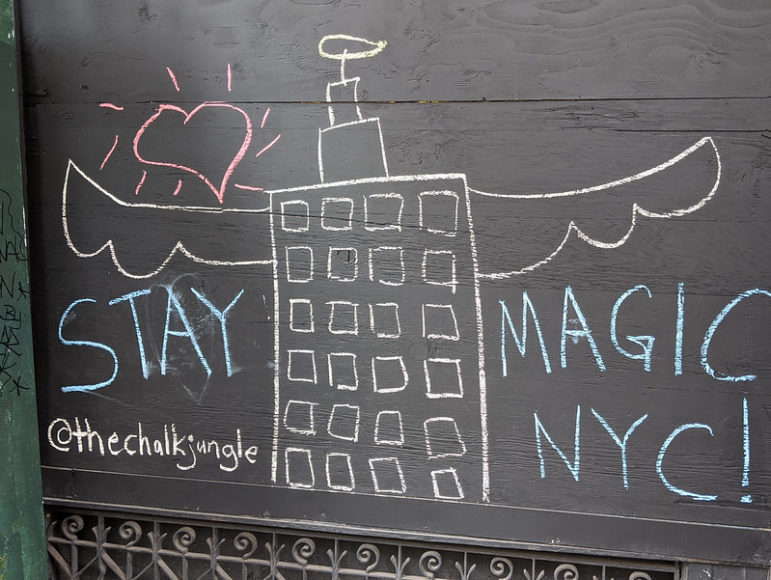
Tomorrow will seem like a step back for New York City residents who had been eager to return to indoor dining, but its indefinite postponement indirectly offers a greater gift than restaurants operating at 50 percent capacity: a few more weeks of the blank slate required to build an even better option.
We are all desperate for life to feel normal again in a city that has borne the brunt of COVID’s first wave, but in our rush to reopen we are hurrying back to habits that left us unfulfilled long before the virus became a presence in our lives. In doing so, we lose the chance to consider what the world ought to look like when we return to it after all these months on pause.
There have been moments during this plague when it’s felt like anything could be possible, so many in fact you’d be forgiven for missing the significance of May 25th. Back when we were all still indoors, the Environmental Protection Agency recorded Manhattan’s air quality as nearly matching that found in the forests of Maine’s Acadia National Park. This surreal piece of trivia should have been inconceivable, especially considering how less than one year earlier New York City stopped issuing new ridesharing licenses in large part due to the overcrowding and pollution caused by idling cars. But it really happened – right here in Midtown – and it offers a ray of hope that if actions meet opportunity, even our most intractable problems can be confronted and conquered after all.
Miss the moment, however, and the memory feels more like a mirage. It’s not even six weeks since that May 25th milestone, and already traffic patterns have nearly returned to pre-COVID levels. Patrons attempting to enjoy outdoor dining may not be able to detect virus droplets in the air, but they can certainly sense the smog from exhaust fumes in a way that makes even the first dinner out in months feel less enjoyable. Now imagine if the mayor had felt pressured to really clear the air, to keep it clean and pure in a way that prioritized pedestrians over pollution. The opportunity existed, even if we didn’t see it before it passed.
Since we stopped the world our focus has been largely on what we’ve lost, too often in terms of things to do rather than the people who have suffered. We have collectively borne great pain with little inquiry as to whether that absence created space for a solution worthy of our sacrifice.
 CityViews are readers’ opinions, not those of City Limits. Add your voice today!
CityViews are readers’ opinions, not those of City Limits. Add your voice today!
Not since New Yorkers like Alexander Hamilton and Aaron Burr debated our best interests have we had the opportunity to truly revisit the merits of the codified laws and established standards we’ve used as the framework for our society. No one is clamoring for a rewrite of the Constitution, but the dissatisfaction and chaos coming from all corners make it abundantly clear that the system we now seem so desperate to reopen was far from flawless, and certainly left large numbers behind. It is hardly a surprise civil unrest sparked when people had the chance to pause. Ideas an impassioned few had carried for years resonated with the rest of us when our distractions were displaced with the space necessary to consider the bigger picture. When we were honest, we admitted room for improvement.
So where does that leave a beleaguered restaurant industry just hoping for the chance to start serving customers at capacity again? While of course it’s not entirely for me to decide, most germane to the moment would be providing employees with paid sick leave. Perhaps this re-envisioning of restaurant culture also involves an examination of our insistence on determining servers’ wages through our practice of tipping, or an honest conversation about the industry’s over-reliance on undocumented workers, and its uncomfortable history of sexual harassment.
If these at all seem like impossible asks, I’ll redirect your attention to May 25th. What we choose to prioritize individually and collectively still matters, and while we remain in this uncomfortable limbo we ought to be able to reconsider our relationship with issues from the serious to the simple.
When the virus is finally behind us, if New York City returns to what it was before the pandemic we’ll have lost a lot more than a few weeks of indoor dining. Why just reopen the world when we can reimagine it, perhaps as a place where the masks can come off and we can breathe again deeply, remembering how although the air here has often felt polluted, there is proof it can be purified after all.
Christopher Seneca is a U.S. Diplomat and freelance writer in New York City.








